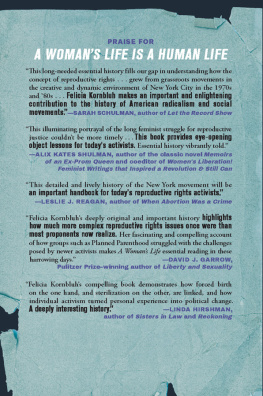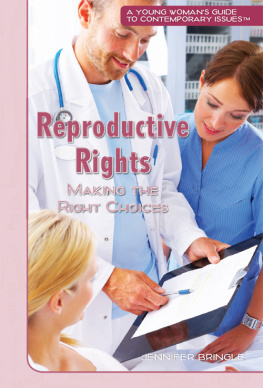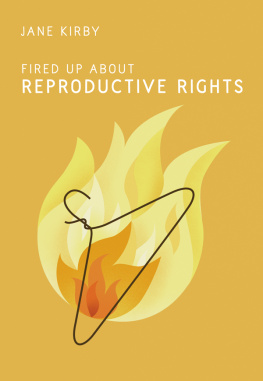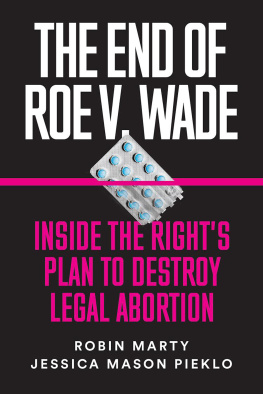Felicia Kornbluh - A Womans Life Is a Human Life: My Mother, Our Neighbor, and the Journey from Reproductive Rights to Reproductive Justice
Here you can read online Felicia Kornbluh - A Womans Life Is a Human Life: My Mother, Our Neighbor, and the Journey from Reproductive Rights to Reproductive Justice full text of the book (entire story) in english for free. Download pdf and epub, get meaning, cover and reviews about this ebook. year: 2023, publisher: Grove Atlantic, genre: Politics. Description of the work, (preface) as well as reviews are available. Best literature library LitArk.com created for fans of good reading and offers a wide selection of genres:
Romance novel
Science fiction
Adventure
Detective
Science
History
Home and family
Prose
Art
Politics
Computer
Non-fiction
Religion
Business
Children
Humor
Choose a favorite category and find really read worthwhile books. Enjoy immersion in the world of imagination, feel the emotions of the characters or learn something new for yourself, make an fascinating discovery.
- Book:A Womans Life Is a Human Life: My Mother, Our Neighbor, and the Journey from Reproductive Rights to Reproductive Justice
- Author:
- Publisher:Grove Atlantic
- Genre:
- Year:2023
- Rating:5 / 5
- Favourites:Add to favourites
- Your mark:
A Womans Life Is a Human Life: My Mother, Our Neighbor, and the Journey from Reproductive Rights to Reproductive Justice: summary, description and annotation
We offer to read an annotation, description, summary or preface (depends on what the author of the book "A Womans Life Is a Human Life: My Mother, Our Neighbor, and the Journey from Reproductive Rights to Reproductive Justice" wrote himself). If you haven't found the necessary information about the book — write in the comments, we will try to find it.
Published to coincide with the fiftieth anniversary of Roe v. Wade, this urgent book from historian Felicia Kornbluh reveals two movement victories in New York that forever changed the politics of reproductive rights nationally
Before there was a Jane Roe, the most important champions of reproductive rights were ordinary people working in their local communities. In A Womans Life Isa Human Life, historian Felicia Kornbluh delivers the untold story of everyday activists who defined those rights and achieved them, in the years immediately before and after Roe v. Wade made abortion legal under federal law.
A Womans Life Is a Human Life is the story of two movements in New York that transformed the politics of reproductive rights: the fight to decriminalize abortion and the fight against sterilization abuse, which happened disproportionately in communities of color and was central to an activism that was about the right to bear children, as well as not to. Each initiative won key victories that relied on people power and not on the federal courts. Their histories cast new light on Roe and constitutional rights, on the difficulty and importance of achieving a truly inclusive feminism, and on reproductive politics today.
This is a book full of drama. From dissident Democrats who were the first to try reforming abortion laws and members of a rising feminist movement who refashioned them, to the nations largest abortion referral service established by progressive Christian and Jewish clergy, to Puerto Rican activists who demanded community accountability in healthcare and introduced sterilization abuse to the movements agenda, and Black women who took the cause global, A Womans LifeIs a Human Life documents the diverse ways activists changed the law and worked to create a world that would support all peoples reproductive choices.
The first in-depth study of a winning campaign against a states abortion law and the first to chronicle the sterilization abuse fight side-by-side with the one for abortion rights, A Womans Life Is a Human Life is rich with firsthand accounts and previously unseen sourcesincluding those from Kornbluhs mother, who wrote the first draft of New Yorks law decriminalizing abortion, and their across-the-hall neighbor, Dr. Helen Rodrguez-Tras, a Puerto Rican doctor who cofounded the movement against sterilization abuse. In this dynamic, surprising, and highly readable history, Felicia Kornbluh corrects the record to show how grassroots action overcame the odds to create policy changeand how it might work today.
Felicia Kornbluh: author's other books
Who wrote A Womans Life Is a Human Life: My Mother, Our Neighbor, and the Journey from Reproductive Rights to Reproductive Justice? Find out the surname, the name of the author of the book and a list of all author's works by series.








